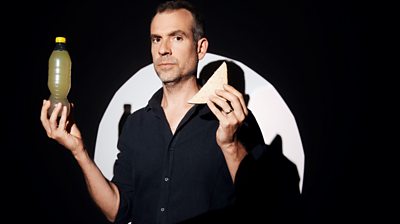We now eat an extraordinary range of ultra-processed foods which are the product of brilliant advances in industrial chemistry and scientific research. Created by ingenious scientists and sold to us by clever marketeers, there’s a lot to love about them: they’re hyper-delicious, super-convenient, have long shelf-lives and are extremely cheap. But a growing body of evidence is linking these industrially produced products to our declining health.
As our consumption of these foods has soared, producers’ profits have sky-rocketed. But there’s now a growing movement demanding controls. Some Latin American countries have been successful in introducing more stringent regulation of these popular goods. In this exploration of the darker side of the food industry, Dr Chris van Tulleken asks, can we change our food environment for the better and improve our health? And, if we find ultra processed foods irresistible, is it really our fault?
Watch Irresistible: Why We Can't Stop Eating on ���˿��� iPlayer and ���˿��� Two on 25 November at 9pm.
AJ2
Q&A with Dr Chris van Tulleken

Why did you want to make this programme?
Poor diet has overtaken tobacco as the leading cause of early death globally. We have previously thought of this as being a problem for the individual - that people are making bad choices. The evidence shows us that this is wrong. The diet that people eat is constrained by the food environment - the food that is available and that they can afford.
This environment has been created by an industry that has very little interest in public health. I wanted to show that when people struggle with food it is not their fault. The products that we consume all day have been developed and marketed by some of the smartest people on earth to be irresistible. The film makes the case that the companies need regulation, just like Big Tobacco.
Is there anything new you discovered whilst making this programme?
The links between the biggest tobacco companies and the biggest food companies were much deeper than I had thought. They aren't just similar to food companies; for a long time they were the same companies. They used the flavour molecules from the cigarette labs, the marketing tools and the distribution networks to create an epidemic of UPF addiction just as they had done with cigarettes. The best thing was hearing from so many industry insiders about the ways that they develop food for maximum profit - using MRI scanners and focus group testing.
Have you managed to implement your own research and findings and avoid these types of foods?
I'm very fortunate that I have a secure job and can afford to eat healthy food. I also have limited exposure to the marketing. The same is not true for most teens - they will encounter ads for the food in all of their social media, in their games, video content, their music and all around them outdoors. And the high street is saturated with shops selling harmful food, often marketed as healthy.
So it's fairly easy for me to eat well but I'm aware that this won't be the case for my kids for very long. That's where most of my focus is - I work with a lot of food psychologists and the most important thing seems to be to role model healthy eating habits and to educate them but ultimately we need their environment to look different. They should not be marketed harmful food, and there should be clear warning labels.
Can we really be in control of what we eat?
No. What we eat is determined by price, marketing and availability. So many people can't afford and don't have time to prepare healthy food. Low income families in the UK are essentially forced to eat unhealthy food.
And the food that is all around us is engineered to drive excess consumption - how does a 15yr old on a limited budget keep control in the face of food development and marketing budgets that run into billions of pounds. They can't.
What do you hope viewers will take away from this?
That they have been gaslit by the food companies and that the food companies cannot be partners in change. They should be treated like tobacco companies because they behave like tobacco companies. These companies should not partner with government. They shouldn't sponsor sports or pay for research. They shouldn't fund food charities. And if someone is feeling ashamed or guilty because they are struggling with food they should know that it is not their fault - it is the food.
Scientific terms glossary

The Bliss Point
The amount of sugar, salt or fat that makes food irresistible.
Vanishing Caloric Density
Foods that melt in your mouth and signal to your brain that you’re not eating as much as you are.
Sonic Branding
The expression of a brand through signature sounds.
Snackification
The phenomenon of people increasingly consuming smaller meals instead of three meals a day driven by producers increasing their launches of snacking formats.
Stomach Share
The amount of digestive space a company can grab from the competition.
Ultra-processed food
Packaged food made using ingredients and processes you couldn’t replicate in your own kitchen.
Hyperpalatable
Food combining unnatural levels of fat, sugar or carbohydrates that can encourage overeating.
Line extension
When a slightly different product is created from an existing product line in order to increase consumption
